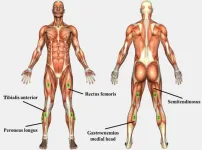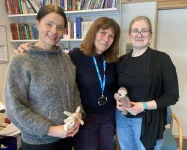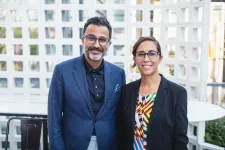(Press-News.org) INDIANAPOLIS – A meta-analysis of studies involving 33,541 cancer patients evaluates the relationship between advance care planning and aggressive vs. comfort-focused end-of-life care. The study, led by Kristin Levoy, PhD, MSN, RN, of the Regenstrief Institute and Indiana University School of Nursing, found a general trend toward less aggressive and more comfort-focused end-of-life care among cancer patients who had engaged in advance care planning, compared to those who did not do so.
Advance care planning is a dynamic process to help prepare people for future decision-making with the goal of ensuring that individuals receive care at the end-of-life that is consistent with their preferences. Rather than a simple process of providing forms to be filled out and never reviewed, the research team noted the importance of the communication that takes place as a part the ongoing approach to advance care planning across disease trajectories.
“Our findings demonstrated that efforts to directly engage patients and caregivers in the communication components of advance care planning were a crucial aspect of improving the end-of-life care that patients with cancer received,” said Dr. Levoy.
“You could think of advance care planning as similar to having car insurance,” she added. “The idea of advance care planning is that you're protecting yourself for future eventualities that may or may not occur, and you're documenting what your healthcare preferences would be if you were to lose decision-making capacity and were unable to speak for yourself. The intention is that any healthcare we deliver should be patient-centered, that is, guided by the patient's’ preferences and goals and consistent with their values.”
Cancer often is characterized by a protracted chronic illness with fairly high levels of functioning and a steep decline in capabilities and increase in symptoms in the last six months of life. Patients generally have time to prepare for the end-of-life and can do so in the form of advance care planning to later inform decisions.
“Advance care planning works in this illness population,” Dr. Levoy noted. “We found it positively impacted the decision of patients and caregivers facing cancer to avoid hospital and intensive care unit admissions and to complete do not resuscitate orders at the end-of-life. So, it worked. Compiling findings from studies involving tens of thousands of patients with cancer allows us to understand the value that advance care planning provides for patients and caregivers across the disease trajectory.”
Cancer patients who engaged in advance care planning were 50 percent more likely to complete do not resuscitate orders than those who did not.
The meta-analysis found advance care planning also was associated with significantly lower odds of various indicators of “aggressive” end-of-life:
• chemotherapy
• intensive care
• hospital admissions
• delayed hospice referrals
• hospital death
The meta-analysis revealed the following outcomes were not impacted by advance care planning:
• hospice use
• cardiopulmonary resuscitation
• emergency department admissions
• mechanical ventilation
End of life preferences are highly individualized. The study authors note that evidence suggests that persons with serious illnesses generally prefer comfort-focused care and desire to avoid aggressive interventions.
“This meta-analysis is important because it provides clear evidence that advance care planning helps patients with cancer receive goal concordant care,” said Regenstrief Institute Interim President and Chief Executive Officer Susan Hickman, PhD, a study co-author and an expert on advance care planning. “While there is still a lot of work that needs to be done to improve advance care planning implementation, our findings confirm that ongoing conversations about goals, values, and preferences are essential to help prepare patients and their caregivers for end-of-life decision-making.”
“Don't Throw the Baby Out with the Bathwater: Meta-Analysis of Advance Care Planning and End-of-life Cancer” is published in the peer-reviewed Journal of Pain and Symptom Management.
Authors and affiliations
Kristin Levoy 1 , Suzanne S. Sullivan 2 , Jesse Chittams 3 , Ruth L. Myers 4 , Susan E. Hickman 5 , Salimah H. Meghani 6
1 Department of Community and Health Systems; Indiana University School of Nursing; Indianapolis, IN; United States; Indiana University Center for Aging Research; Regenstrief Institute; Indianapolis, IN; United States; Indiana University Melvin and Bren Simon Comprehensive Cancer Center; Indianapolis, IN; United States.
2 School of Nursing; University at Buffalo; State University of New York; Buffalo, NY; United States.
3 BECCA (Biostatistics, Evaluation, Collaboration, Consultation & Analysis) Lab, Office of Nursing Research; University of Pennsylvania School of Nursing; Philadelphia, PA; United States.
4 Department of Community and Health Systems; Indiana University School of Nursing; Indianapolis, IN; United States.5 Department of Community and Health Systems; Indiana University School of Nursing; Indianapolis, IN; United States; Indiana University Center for Aging Research; Regenstrief Institute; Indianapolis, IN; United States; Indiana University Melvin and Bren Simon Comprehensive Cancer Center; Indianapolis, IN; United States.
6 New Courtland Center for Transitions and Health, Department of Biobehavioral Health Sciences; University of Pennsylvania School of Nursing; Philadelphia, PA; United States; Leonard Davis Institute of Health Economics; University of Pennsylvania; Philadelphia, PA; United States.
Funding
During the conduct of this study, Dr. Levoy was supported, in part, by a Future of Nursing Scholars Award from the Robert Wood Johnson Foundation, a Doctoral Degree Scholarship in Cancer Nursing (131753-DSCN-18-072-SCN) from the American Cancer Society, and a National Institutes of Health’s National Institute of Nursing Research’s Ruth L. Kirschstein National Research Service Award program (T32 NR009356). Dr. Sullivan was also supported, in part, by a NIH/NINR Ruth L. Kirschstein Predoctoral Individual National Research Service Award (F31 NR016394), the National Library of Medicine National Institute of Aging Institutional Grants for Research Training in Biomedical Informatics (T15 LM012495), and an NIH/NIA award R03 AG067159. Dr. Hickman is currently supported by NIH/NIA awards R33 AG057353, R01 AG057733 and R01 AG056618. Dr. Meghani is currently supported by NIH/NINR award R01 NR017853 and NIH/NCI award R01 CA270483.
About Kristin Levoy, PhD, MSN, RN
In addition to her role as a research scientist in the IU Center for Aging Research at Regenstrief Institute, Dr. Levoy is an assistant professor at IU School of Nursing and a researcher at the IU Melvin and Bren Simon Comprehensive Cancer Center.
About Susan Hickman, Ph.D.
In addition to serving as interim president and CEO of the Regenstrief Institute and leading the IU Center for Aging Research at Regenstrief Institute, Susan Hickman, PhD, is a professor at Indiana University School of Nursing, a professor and Cornelius and Yvonne Pettinga Chair of Aging Research at IU School of Medicine, and the co-director of the IUPUI Research in Palliative and End-of-Life Communicating and Training (RESPECT) Signature Center.
About Regenstrief Institute
Founded in 1969 in Indianapolis, Regenstrief Institute is a local, national and global leader dedicated to a world where better information empowers people to end disease and realize true health. A key research partner to Indiana University, Regenstrief and its research scientists are responsible for a growing number of major healthcare innovations and studies. Examples range from the development of global health information technology standards that enable the use and interoperability of electronic health records to improving patient-physician communications, to creating models of care that inform practice and improve the lives of patients around the globe.
Sam Regenstrief, a nationally successful entrepreneur from Connersville, Indiana, founded the institute with the goal of making healthcare more efficient and accessible for everyone. His vision continues to guide the institute’s research mission.
About IU School of Nursing
Indiana University School of Nursing was established in 1914 with the opening of Long Hospital in Indianapolis, Indiana. The School unites into a core structure with three campus locations: Bloomington, Indianapolis (IUPUI), and Fort Wayne. Almost 23,000 alumni across the globe are leaders in clinical practice, research, education, and innovation. The Master’s and DNP programs were named to the 2023 U.S. News & World Report Best Graduate Nursing Schools and in 2023 U.S. News & World Report Best Online Programs ranked the Master’s #10 in the nation. The National League for Nursing has designated the School as a Center of Excellence in Nursing Education in two areas. Academic programs include three tracks in the undergraduate program, nine
tracks in the master’s program, post-master’s options, a post-masters DNP, and a PhD. The School is known for a robust program of research focused on quality of life in chronic illness, nursing education, and cancer prevention and control.
END
Advance care planning produces trend toward less aggressive and more comfort- focused care for patients with cancer
2023-04-20
ELSE PRESS RELEASES FROM THIS DATE:
Ground reaction force and moment estimation through EMG sensing using long short-term memory network during posture coordination
2023-04-20
Imagine by only attaching a number of electromyography (EMG) sensors to your legs, your motion in the future several seconds can be predicted. Such a way of predicting motion via muscle states is an alternative to the mainstream visual cue-based motion prediction, which heavily relies on multi-view cameras to construct time-series posture. However, there is still a gap between muscle states and future movements.
Muscles act upon the ground, which induces ground reaction force. Together with muscle states and ground reaction force, body movements are produced. Therefore, estimating ...
ASBMB cautions against sacrificing science funds to make debt-ceiling deal
2023-04-20
The American Society for Biochemistry and Molecular Biology released a statement this week calling on policymakers participating in debt-ceiling negotiations to preserve funding to major scientific agencies such as the National Institutes of Health, National Science Foundation and the Department of Energy.
In January, the United States reached its debt limit of $31.4 trillion. House Republicans are resisting raising the debt ceiling unless federal spending levels are reduced to fiscal year 2022 levels, which would reduce discretionary funding ...
Important role of intestinal immune cells in iron deficiency identified for the first time
2023-04-20
Iron deficiency is one of the five main causes of impaired health. It affects 30 percent of the world's population, particularly women. Why iron deficiency can occur, even if enough iron is supplied through the diet, has not yet been sufficiently clarified in scientific research. For the first time, a research team from MedUni Vienna has discovered that certain immune cells in the intestine play an important role in iron absorption in the body. The study results may provide a new approach for possible therapeutic measures and were recently published in the journal "Blood".
Approximately one to two milligrams of ...
Versatile, high-speed, and efficient crystal actuation with photothermally resonated natural vibrations
2023-04-20
Every material possesses a unique natural vibration frequency such that when an external periodic force is applied to this material close to this frequency, the vibrations are greatly amplified. In the parlance of physics, this phenomenon is known as “resonance.” Resonance is ubiquitous in our daily life, and, depending on the context, could be deemed desirable or undesirable. For instance, musical instruments like the guitar relies on resonance for sound amplification. On the other hand, buildings and bridges are more likely to collapse under an earthquake if the ground vibration frequency matches their natural frequency.
Interestingly, natural vibration has not received ...
Children’s language development doesn’t just happen through words
2023-04-20
Children learn to understand language and to speak largely independently of cognitive functions like spatial awareness, working (short-term) memory and perception (interpreting and organizing sensory impressions), according to established theory and tradition within linguistics.
Professor Mila Vulchanova at the Norwegian University of Science and Technology (NTNU) heads the university's language laboratory and studies language learning. Her findings over several years have challenged this linguistic assumption and demonstrated ...
Researchers identify a potential new therapeutic target in Parkinson’s disease
2023-04-20
TORONTO - In a study published in Nature Communications, a team led by Krembil Brain Institute Senior Scientists, Drs. Lorraine Kalia and Suneil Kalia, and University of Toronto (U of T) Professor, Dr. Philip M. Kim, identified a protein-protein interaction that contributes to Parkinson’s disease.
In the disease, a protein called α-synuclein (a-syn) accumulates in the brain and leads to cell death. Much research is currently focused on clearing a-syn with antibodies or using small molecules to prevent a-syn from aggregating. In this study, the researchers took an alternate approach by looking for protein-protein interactions that may be promoting ...
Dr. Natalya Chernichenko named site chief of otolaryngology at NewYork-Presbyterian Brooklyn Methodist Hospital
2023-04-20
Dr. Natalya Chernichenko, a leading otolaryngologist who specializes in tumors of the head and neck, has been named site chief of otolaryngology at NewYork-Presbyterian Brooklyn Methodist Hospital, effective May 1. Dr. Chernichenko was also recruited to Weill Cornell Medicine as an assistant professor of clinical otolaryngology and vice chair in the Department of Otolaryngology—Head and Neck Surgery.
In her new role, Dr. Chernichenko will lead a skilled team of specialists and surgeons providing comprehensive otolaryngology care, also known as ear, nose and throat, or ENT care, and further develop the hospital’s head and neck surgical oncology ...
FAU gets $6 million to increase mental health counselors in Florida schools
2023-04-20
Youth mental and emotional health is a matter of high priority in Florida. A 2019 Florida Department of Health survey showed that 12.7 percent of Florida high schoolers (grades 9 to 12) had carried a weapon; 21.2 percent were involved in a physical altercation; 24.2 percent reported having been teased about their size, weight or physical appearance; and 11.3 percent and 14.9 percent were bullied electronically or on school property, respectively.
In this same survey, 15.6 percent of Florida high school students reported they had seriously considered attempting suicide, and 33.7 percent acknowledged feeling sad or hopeless for two or more weeks in a row. Alarmingly, the 2019 survey ...
University of Cincinnati research examines the impact of maternal stress during pregnancy on child’s health
2023-04-20
New research out of the University of Cincinnati examines the impact that maternal stress during pregnancy has on the neurodevelopment of babies.
The study was published in the journal Molecular Psychiatry.
Prenatal maternal stress life events are associated with adverse neurodevelopmental outcomes in offspring. Biological mechanisms underlying these associations are largely unknown, but a chemical reaction in the body in which a small molecule known as a methyl group gets added to DNA, called DNA methylation, likely plays a role, according to researchers. These findings could provide new insights into how the fetal environment potentially influences ...
TIBI Director and CEO Ali Khademhosseini receives Technology Innovation and Development award from the Society for Biomaterials
2023-04-20
(LOS ANGELES) – April 20, 2023 - Dr. Ali Khademhosseini has been awarded the 2023 Technology Innovation and Development Award from the Society of Biomaterials (SFB). The award honors those whose research, scientific innovations, and leadership are used to develop novel products or technologies to benefit patients.
Dr. Khademhosseini is the founding Director and CEO of the Terasaki Institute for Biomedical Innovation (TIBI), which incorporates a variety of interdisciplinary research platforms and uses patient-derived cells for micro- and ...





